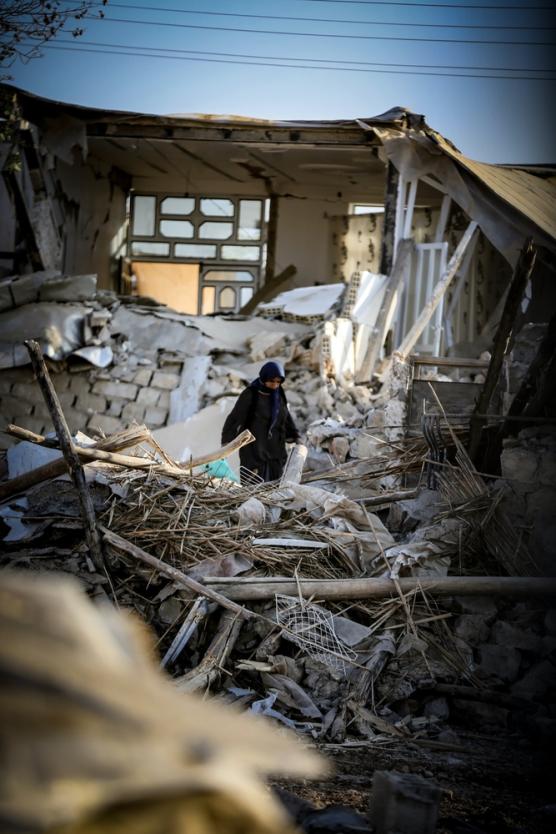Kevin Smets is a professor of Communication Studies at VUB and has a great love for Turkey, which is also reflected in his academic work. In his project Reel Borders, he investigates the perception around the Turkish-Syrian border. Coincidentally, he was prospecting for this when the earthquake took place. He received an email from his desperate colleague
Where are you now?
In Istanbul, I have been here on a research trip since 30 January. We are doing preparatory fieldwork to come back later with the ERC project team.
And then the earth cracks.
We had plans to go to the area. A project around the Turkish-Syrian border. We will have to revise that.
What can you do?
Specifically, there is little I can do. Frustrating. I have only been able to attend a memorial moment at a Syrian cultural centre. Apart from that, a lot of listening to people. We are, however, in contact with several colleagues who know they can count on our support.
"In the face of institutional incompetence, our students and graduates are trying to organise their own ways to bring aid. For example, Samandağ, Hatay’s district, still cannot be reached by land. There is no electricity, no fuel. Supplies are exhausted, and there is no drinkable water."
İlke Şanlıer Yüksel
You teach film history at VUB, how did you get so involved in Turkey?
In the final year of high school, I befriended a Turkish exchange student. Through her, I became fascinated by Turkish language and culture. I ended up doing a PhD and research on it. I saw her a few days ago here in Istanbul. The friendship has remained.
What's the mood like?
A mix of anger and disbelief. It is not the earthquake that is killing, but the buildings. There is frustration at how the country is being run. I feel it is widely felt. Trust in the government is gone. First there was the economic crisis; with all the corruption, this seems like the straw. But there is no quick fix. It will take at least 10, 15 years.
That said: there is also a lot of initiative to help and a lot of solidarity. Even with the huge social disparities.
"One of our colleagues in the department went into her damaged house to collect some belongings, and the house collapsed on her in the second earthquake. Fortunately, she was rescued, but now she has no home."
İlke Şanlıer Yüksel
How will it affect Turkey in the long run?
Inevitably, it will have political repercussions. I feel by everything that the mismanagement will not be accepted. But I try to be optimistic. And hope that corruption will be fought and stricter building codes will be introduced. What I already see is that there is and great solidarity between the east and west of the country.
What now with your research project?
We had planned to go to the border region this autumn. In a few months, we will evaluate whether it can go ahead. I fear the worst. The cities we wanted to go to have been hit hard. But we must not let the regions off the hook either. They need the contacts and it is important to develop nuanced knowledge from that region.

Dramatic mail İlke Şanlıer Yüksel to Reel Borders
Reel Borders is Kevin Smets' research project studying how borders are depicted in film. İlke Şanlıer Yüksel, one of the project's main partners in Turkey described the impact of this disaster on local communities in a courageous email to Reel Borders.
"I haven't slept for days, so forgive me if my English is not perfect. I don't need to tell you the gravity of the situation here, you will already have seen the news images, and I know are already doing all that you can: but believe me, the experience of actually being here is unimaginable. Maraş and Hatay - these two cities have been levelled to the ground. The destruction is so immense that I am not sure if there is even the slightest possibility of reconstruction."
Her whole mail is here.
Reel Borders
Reel Borders is a five-year research project focusing on the relationships between film and borders. It explores how film has been used to represent borders in different ways over the past 120 years. Recognising that borders are more than territorial lines or infrastructures, the project also addresses issues of belonging, identity and imagination.
Reel Borders focuses on three border areas and regions: the Irish border, the Spanish-Moroccan border and its exclaves Ceuta and Melilla, and the Turkish-Syrian border.
Financial help is important now. You can make donations
You can make a donation through the 12-12 Consortium. Donations to 12-12 are distributed to the seven members of the Consortium. These are Caritas International, Doctors of the World, Handicap International, Oxfam Solidarity, Red Cross, Plan International Belgium and UNICEF Belgium. The money thus goes to humanitarian relief and longer-term reconstruction.